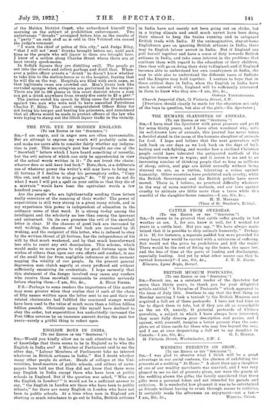THE EVIL EYE IN MODERN ENGLAND. [To THE EDITOR or
THE " SPECTATOR."] Sta,—I am angry, and in anger men are often unreasonable. But an attempt to express my wrath will probably calm me and make me more able to consider fairly whether my indigna- tion is just. This morning's post has brought me one of the " Snowball " letters which I have heard something of recently, but the evil nature of which can only be apprehended in view of the actual words written in it : "Do not break the chain: whoever does so will have bad luck." Here,then, is a deliberate use of whatever power the writer's will may have to bring me ill fortune if I decline to obey his peremptory order, "Copy this out, and send it to nine people," &c. "If you do not do what I want I will put a spell on your cattle so that they die of a murrain " would have been the equivalent words a few hundred years ago.
Are the people who are lightheartedly sending these letters really conscious of the meaning of their words? The power of superstition is still very strong in a great many minds, and in my experience this power is independent of education in the ordinary sense of that word. It is strong to-day among the intelligent and the scholarly no less than among the ignorant and unlearned. On its own premises the evil of the snowball letter is clear. If the chances of good luck are increased by well wishing, the chances of bad luck are increased by ill wishing, and the recipient of this letter, who is induced to obey by the written threat of fortune, has the independence of his will by that much weakened, and by that much henceforward less able to resist any evil domination. This scheme, which would make us more prone to rely for good fortune upon the wishes of others than upon our own efforts and conduct, is one of the small but far from negligible influences at this moment sapping the vitality of our people. In the present general depression men clutch eagerly at every proffered aid without sufficiently examining its credentials. I hope earnestly that this statement of the danger involved may cause any readers who receive these snowball commands to consider seriously
before obeying them.—I am, Sir, &c., A. Huou FISHER.
P.S.—Perhaps to some readers the importance of this matter may seem greater when they realize that if each of the chain of fifty names written upon the letter sent to me and their co- related chainmates had fulfilled the command stamps would have been used to the value of much more than a billion billion billion pounds. Obviously many like myself have declined to obey the order, but superstition has undoubtedly increased the Post Office revenue by an immense amount during the past few years—surely a pitiful thing to reflect upon.


































 Previous page
Previous page